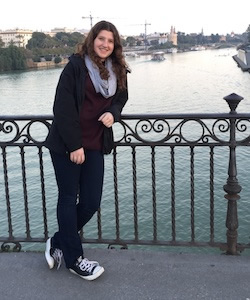Much like the nation of Spain at present, I am currently in a state of limbo. Upon arriving in Sevilla, I quickly discovered that the next few months would entail a constant series of linguistic, geographic, and intellectual switches on a daily basis. I wake up in the morning in my homestay in Los Remedios, a neighborhood that can best be understood as the Brooklyn of Sevilla. It is situated on the far side of the Guadalquivir River, opposite the picturesque Torre de Oro and the ancient labyrinth of buildings that makes up El Centro. Every morning I bid adios to my señora and cross the Puente de San Telmo (San Telmo Bridge) in order to attend classes, marking my first switch of the day. To get to class, I must walk through Sevilla’s equivalent of Times Square, a bustling cacophony of sound where no less than eight gelato stands hold court. This is where I hear English, the broken words echoing around me as I am taken for a tourist by the hawkish shopkeepers and offered discounts on bus tours and flamenco lessons. Once I make it off the main drag, I am immediately enveloped by the maze that is Sevilla. There I become both wanderer and resident as I explore new paths that will (hopefully) lead me to my school.
It’s only the morning and I already feel as if I have transitioned through multiple identities, none ever settling comfortably before being pushed aside to make room for the next. I feel them all jostling for control within me, and the twisted Spanglish of my thoughts prohibits clear thinking about any of my many selves here in this city. As a foreign student I am not quite a resident, but not quite a visitor either, and I can actively sense my movement between these two extremes on a minute-by-minute basis.
I see a lot of my own personal confusion about identity in the country itself. On a very obvious level, the government of Spain is currently experiencing a period of near chaos. After inconclusive elections in December 2015, Mariano Rajoy, the acting prime minister, began working to form a coalition government but has thus far been unsuccessful. With each passing day it becomes more apparent that the head of the next government will not be Rajoy, but rather a member of his party’s opposition. With this development, Spain may well go from being a country governed by the right to one led by the Spanish Socialist Workers’ Party (Partido Socialista Obrero Español), in conjunction with other even-more left-leaning parties. However, the challenges of forming this government are great, as some of the smaller leftist parties are directly at odds over a crucial point—the potential independence of Catalonia. This is really the heart of the problem, since the formation of this government may very well decide the future of the Spanish state.
What I see playing out on the news is a very public display of what I experience privately everyday. Much of my identity in Sevilla is determined by factors outside of my control, such as how I am perceived by the Spaniards I come in contact with and where I am within the city at a given moment. In that same vein, Spanish political parties are now being forced to crunch the parliamentary numbers because of an indecisive electorate. I am confident that as time passes I will become more comfortable with my place in this city, and my identity will find a kind of equilibrium. I just hope that the Spanish people will be patient with me, as well as their government, as we try and work things out.

